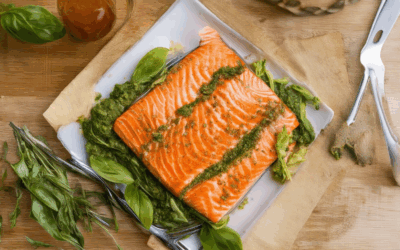Are you struggling to shed those stubborn pounds and wondering if there’s a better way to fuel your weight loss journey? Did you know that certain types of fish can actually help you achieve your weight loss goals? While some foods might promise quick fixes, the truth lies in a balanced diet rich in nutrients that support your body’s natural processes. Fish, often celebrated for its lean protein and healthy fats, emerges as a powerful ally in the fight against excess weight. From boosting metabolism to reducing fat storage, fish offers unique benefits that make it a cornerstone of any weight loss plan. Whether you’re curious about which fish are best for burning fat or how to incorporate them into your meals, this article dives into the science behind fish and weight loss, sharing expert-backed tips and insights to help you make informed decisions about your diet. Keep reading to discover why fish might just be your secret weapon in your quest for a slimmer, healthier self.

What Fish Is Good for Weight Loss?
Fish can be an excellent addition to a weight-loss diet due to their typically low calorie and high protein content. Here are some fish varieties that are particularly well-suited for weight management:
- Tilapia : A lean fish with minimal fat and calories, making it a great option for those watching their weight. It’s also mild in flavor, making it easier to incorporate into various meals.
- Cod : Known for its tender texture and mild taste, cod is another excellent choice. It’s low in calories and high in protein, helping you feel full while consuming fewer calories.
- Flounder : Flounder is a delicate fish with a subtle flavor and low fat content. Its versatility makes it a good option for meal prep and weight loss.
- Sole : Similar to flounder, sole is a lean fish with a mild taste. It’s ideal for those looking to maintain a healthy metabolism while shedding pounds.
These fish are not only low in calories but also rich in essential nutrients, including omega-3 fatty acids, which support heart health and overall well-being. Incorporating these fish into your diet can help you stay on track with your weight loss goals while providing satisfying, nutrient-dense meals.
Is Fish Good for Losing Belly Fat?
Fish is an excellent ingredient for supporting overall health, including weight management and reducing belly fat. Here’s how:
- Rich in Protein: Fish provides high-quality protein, which helps you feel full longer and supports muscle maintenance, aiding in weight management.
- Omega-3 Fatty Acids: Fish is packed with omega-3s like salmon and mackerel, which have anti-inflammatory properties and may help reduce visceral fat.
- Supports Metabolism: Some fish species, like cod and tilapia, are low in calories and high in protein, making them ideal choices for those looking to lose belly fat.
- Helps Control Hunger: Eating fish can keep you satiated, helping you avoid unhealthy snacking and overeating.
- May Improve Inflammation: Chronic inflammation is linked to abdominal fat gain. The omega-3s in fish can help reduce this inflammation.
For best results, opt for lean fish like cod, flounder, or tilapia and incorporate it into balanced meals. Avoid deep-frying fish to maintain its nutritional benefits. Instead, try grilling, baking, or steaming your favorite fish dishes for a healthier option.
Looking for more fish recipes or meal ideas? Explore our collection of fish meal plans and discover how to make delicious, nutritious dishes with fish as the star ingredient.

What Fish Burn the Most Fat?
Fatty fish are known for their high content of omega-3 fatty acids, which may support fat burning and overall health. Some of the best options include:
- Salmon : Rich in omega-3s, particularly EPA and DHA, which may help reduce inflammation and promote fat loss.
- Herring : Another excellent source of omega-3s, herring is often consumed as part of a healthy diet to aid in weight management.
- Sardines : Known for their high fat content, sardines are packed with omega-3s and other nutrients.
- Mackerel : A nutrient-dense fish with significant amounts of omega-3 fatty acids, making it a great choice for fat burning.
The high fat content in these fish helps keep you feeling full longer, which can support your weight management goals. Additionally, the protein found in fish may help boost your metabolism slightly, contributing to fat burning.
For the best results, pair these fatty fish with a balanced diet and regular physical activity. Remember to enjoy them in moderation as part of a healthy lifestyle.
Looking for recipe ideas? Check out our cooking methods to learn how to prepare these fish in delicious ways!

Can you eat fish every day to lose weight?
Eating fish every day can be a healthy component of a weight-loss plan, but it’s important to consider the overall balance of your diet and portion sizes.
Fish is lean and low in fat, making it a great source of high-quality protein. Protein helps keep you full and supports muscle maintenance, which is essential for weight loss and metabolism regulation. Some species of fish, like salmon and mackerel, are particularly rich in omega-3 fatty acids, which may play a role in reducing inflammation and supporting cardiovascular health, both of which are beneficial for weight management.
Research suggests that incorporating fish into your meals can help you consume fewer calories overall compared to other protein sources like chicken or beef. However, the real benefit comes from maintaining a calorie deficit while ensuring you’re getting essential nutrients. Pairing fish with a variety of vegetables, whole grains, and other proteins ensures your body gets a well-rounded supply of nutrients.
Portion control is key regardless of the food source. Overeating any high-protein food, including fish, can lead to weight gain. Focus on portion sizes that align with your daily caloric needs and energy expenditure.
For optimal weight loss, combine fish with:
- A variety of colorful vegetables for vitamins and antioxidants
- Whole grains for sustained energy
- Regular physical activity
- Enough sleep
- Stress management
While fish is a fantastic choice, it’s not a magic solution for weight loss. A holistic approach that includes mindful eating, regular exercise, and a balanced diet is the most effective path to achieving and maintaining a healthy weight.
For more tips on incorporating fish into your weight-loss journey, check out our Seafood Diet Guide and explore our collection of fish recipes .
Which is Healthier: Chicken or Fish?
When deciding between chicken and fish, it’s essential to evaluate their nutritional profiles and health impacts. While both are commonly consumed proteins, they offer distinct benefits and risks.
Nutritional Benefits of Fish
- Fish is rich in omega-3 fatty acids, particularly EPA and DHA, which are beneficial for heart health and reducing inflammation.
- Fish consumption can help lower triglycerides and may contribute to a reduction in the risk of certain types of cancer.
- Some fish species, like sardines and salmon, are high in vitamin D and calcium, contributing to bone health.
Nutritional Profile of Chicken
- Chicken breast is a lean protein source, making it a good choice for weight management and muscle repair.
- It is lower in saturated fats compared to other meats like beef or pork.
- However, chicken can contain contaminants like arsenic and acrylamide, which may pose health risks, especially if not properly prepared.
Health Impacts and Risks
- Fish can help regulate blood pressure and reduce LDL (“bad”) cholesterol, making it a heart-healthy option.
- Mercury levels in some fish species can be a concern, particularly for pregnant women and children, but smaller fish like sardines are generally safer.
- Chicken, while not as risky as red meat, can still increase cholesterol levels and contribute to heart disease if consumed in excess.
Choosing the Healthier Option
- If aiming for optimal cardiovascular health, fish is often the better choice due to its higher omega-3 content.
- For individuals monitoring cholesterol or concerned about contaminants, chicken may be a more manageable option in moderation.
- Consider the size and type of fish, as smaller fish like sardines and tilapia are generally lower in mercury and contaminants.
Both foods have their place in a balanced diet. Opting for fish can provide significant health benefits, while chicken remains a versatile and accessible protein source. Always aim for fresh, properly prepared options when possible and balance your intake for overall health.

What’s the Healthiest Fish to Eat?
The healthiest fish to eat depends on several factors, including its nutritional profile, mercury levels, and your dietary needs. Here’s a breakdown of some of the healthiest options:
- Fatty Fish:
- Salmon – Rich in omega-3 fatty acids, particularly EPA and DHA, which support heart health and brain function.
- Sardines – High in selenium and omega-3s, making them a great choice for thyroid health.
- Mackerel – Contains vitamin D and omega-3s, supporting immune function and reducing inflammation.
- Lean Fish:
- Cod – Low in fat and high in protein, making it a versatile option for low-calorie meals.
- Tilapia – A lean protein source with minimal fat and mercury, ideal for those concerned about mercury intake.
- Flounder – Another lean fish with tender texture and low fat content.
When choosing fish, consider:
- Mercury Levels: Larger fish like tuna and swordfish may have higher mercury levels, so smaller fish like sardines and mackerel are safer choices.
- Portion Sizes: Aim for 2-3 servings per week, as recommended by health organizations like the American Heart Association.
- Sustainability: Choose fish from sustainably fished stocks to protect marine ecosystems.
Including a variety of fish in your diet ensures you get a balanced intake of nutrients like omega-3s, protein, and essential vitamins. Whether you prefer fatty or lean fish, both offer unique health benefits.
Conclusion
For optimal health, incorporate a mix of fatty fish like salmon, sardines, and mackerel along with lean fish such as cod and tilapia into your diet. This approach provides a well-rounded intake of nutrients while minimizing mercury concerns.




0 Comments